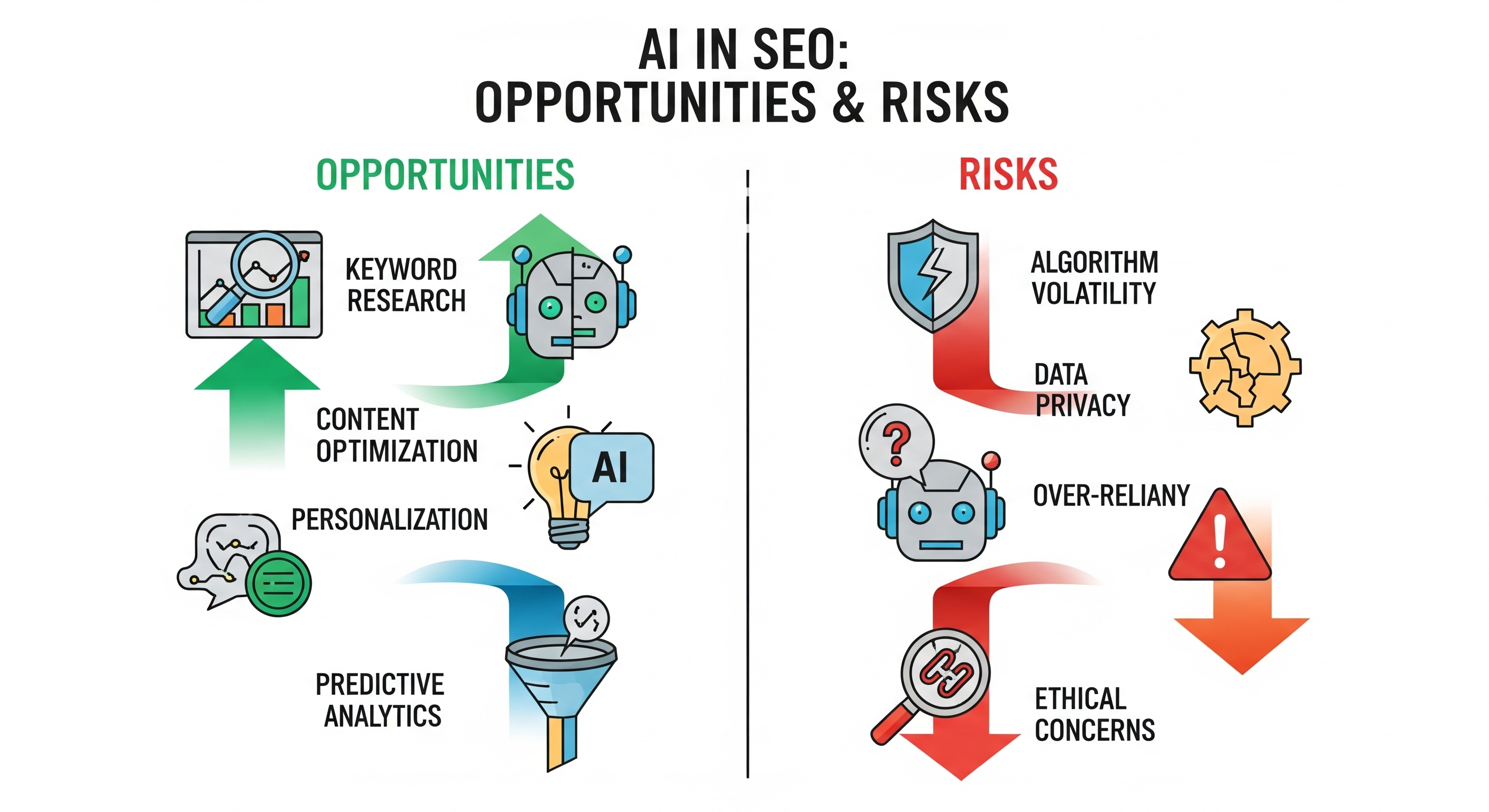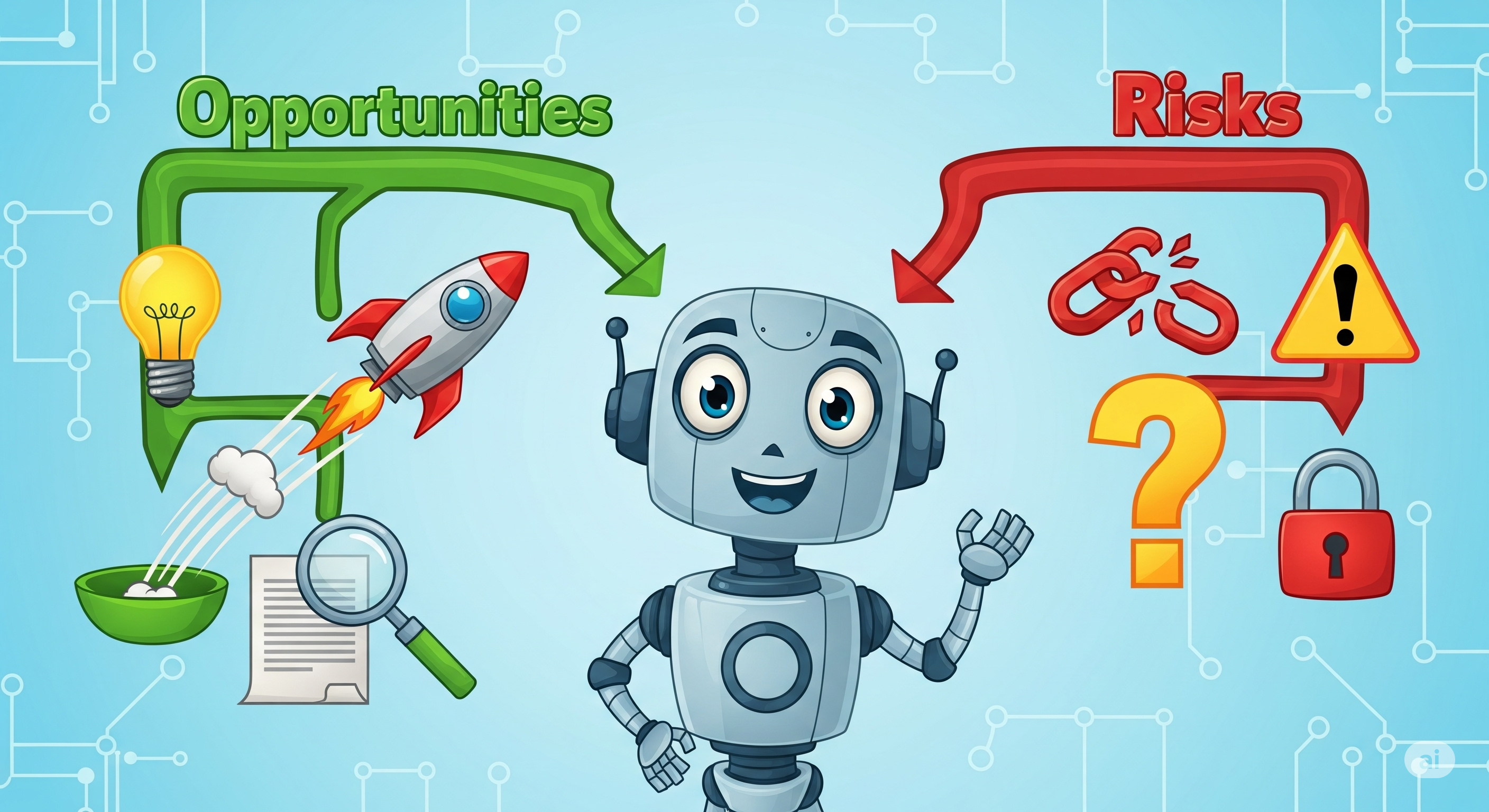Artificial Intelligence (AI) is changing how we live, work, and market online. One of the most exciting and debated areas of this change is AI in SEO (Search Engine Optimization). Businesses, marketers, and content creators are embracing AI tools to automate tasks, gain insights, and improve search performance. But with great power comes great responsibility. This article explores the opportunities, risks, and tools involved in using AI for SEO.
Key Takeaways
- AI in SEO can improve efficiency, keyword research, and content optimization
- There are clear risks such as over-reliance, data privacy, and algorithmic bias
- Businesses should combine AI with human creativity for best results
- Many powerful AI tools exist for content, analytics, and technical SEO
- A balanced, thoughtful strategy helps mitigate risks and enhance performance
Understanding AI in SEO
AI in SEO means using artificial intelligence to automate, analyze, and optimize search engine-related tasks. This includes content creation, keyword planning, technical SEO, user behavior analysis, and competitor tracking. AI can process huge amounts of data, adapt in real-time, and deliver insights faster than humans ever could.
How AI is Used in SEO
- Keyword Research: AI tools find new, long-tail keywords with higher conversion potential
- Content Optimization: AI suggests improvements in readability, structure, tone, and keywords
- Search Intent: AI analyzes user behavior to help tailor content to search intent
- Technical SEO: AI audits websites, fixes errors, and enhances page load times
- Competitor Analysis: AI tracks competitor keywords, backlinks, and SERP trends
“AI helps SEO professionals spend less time on repetitive tasks and more time on strategy.”
Benefits of AI in SEO
There are many advantages to using AI for SEO — especially in a digital environment where speed, accuracy, and personalization matter more than ever.
| Benefit | Description |
|---|---|
| Time Efficiency | AI automates tasks like keyword research and technical audits, saving time and resources |
| Content Quality | AI tools suggest ways to improve content readability, keyword density, and relevance |
| Scalability | AI enables you to optimize hundreds of pages quickly and consistently |
| Predictive Analysis | AI identifies future trends and keyword opportunities based on data |
| Enhanced User Experience | AI personalizes the content for users based on intent and behavior |
“AI doesn’t replace SEO experts. It empowers them.”
Risks and Challenges of AI in SEO
While AI can boost productivity, it also introduces new risks. Over-relying on machines without oversight can harm your SEO strategy.
| Risk | Description |
|---|---|
| Over-Reliance | Depending too much on AI may reduce human creativity and insight |
| Inaccurate Suggestions | AI tools can misinterpret search intent or suggest non-contextual keywords |
| Algorithm Bias | AI models may have built-in bias, affecting content fairness and ranking potential |
| Data Privacy | AI tools often rely on user behavior data, raising privacy and compliance issues |
| Search Engine Penalties | Misuse of AI-generated content can lead to duplicate content or thin content, hurting rankings |
“The best SEO strategies combine AI’s power with human oversight to ensure ethical and effective results.”
Popular AI SEO Tools
Here are some of the most used AI-based tools that help SEO professionals:
- Surfer SEO: Optimizes content with on-page data, keywords, and structure
- Jasper AI: Generates AI-written SEO content quickly
- MarketMuse: Uses AI to suggest topic clusters and content gaps
- Clearscope: Recommends keyword usage for better readability and SEO
- Alli AI: Provides automated technical SEO fixes and bulk optimizations
- Frase.io: Helps create content briefs and optimize based on SERP data
“Choose AI tools that align with your SEO goals, team structure, and technical requirements.”
Real-World Applications
Let’s explore how businesses use AI in SEO today:
Case Study 1: eCommerce Site Optimization
An online retailer used SurferSEO and Jasper to rewrite 500+ product pages. Result: a 38% increase in organic traffic in 3 months.
Case Study 2: Local SEO with AI
A local HVAC business used AI to identify local keyword trends and optimize Google Business Profile listings. Bookings grew 22% in 6 weeks.
Case Study 3: Enterprise-Level SEO
A major media site automated content clustering using MarketMuse. They saw a 60% boost in time-on-site and a 25% increase in indexed pages.
Video: How AI is Changing SEO
Here’s a great explainer video on YouTube that dives deep into this topic:
AI SEO Workflow Example
Here’s how a typical AI-powered SEO content workflow might look:
- Use Frase or MarketMuse to identify content gaps and keywords
- Draft initial content with Jasper or ChatGPT
- Optimize the content with SurferSEO or Clearscope
- Run grammar and tone check with Grammarly
- Upload and monitor performance using Google Search Console + Ahrefs
Table: SEO Metrics to Monitor with AI
| Metric | Why It Matters | AI Tool Example |
|---|---|---|
| Keyword Ranking | Tracks SERP position | SEMrush, Ahrefs |
| CTR (Click-Through Rate) | Shows if titles/meta are compelling | Google Search Console |
| Page Load Speed | Improves UX and mobile rankings | PageSpeed Insights, Alli AI |
| Content Score | Measures content relevance & structure | Surfer SEO |
| Bounce Rate | Indicates if users found value | Google Analytics |

Balancing AI and Human Input
AI tools are powerful, but they lack the emotional intelligence, storytelling ability, and cultural context humans bring. SEO content still needs creativity, empathy, and industry expertise.
- Use AI to analyze, not to decide
- Edit AI-generated content to fit your brand tone and context
- Don’t sacrifice originality for speed
SEO Trends with AI in 2025 and Beyond
The future of AI in SEO includes even more personalized search experiences, voice-optimized content, and predictive search algorithms.
| Trend | Description |
|---|---|
| Voice Search Optimization | AI helps understand long-tail, conversational queries |
| Predictive SEO | AI can predict what users will search next |
| Search Experience Optimization | UX and UI play a larger role in rankings |
| AI-Generated SERPs | Google’s SGE (Search Generative Experience) will reshape SEO formats |
Conclusion
AI is no longer a futuristic concept in SEO — it’s here and evolving rapidly. The key to success is using it wisely. By combining the speed and efficiency of AI with human insight and strategy, you can achieve exceptional results. But be cautious: don’t let automation replace your critical thinking, creativity, and ethical decision-making.
“AI is a powerful SEO ally — if used with responsibility and a human touch.”
